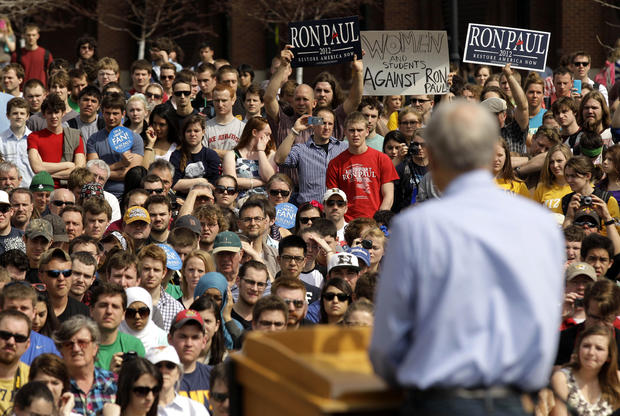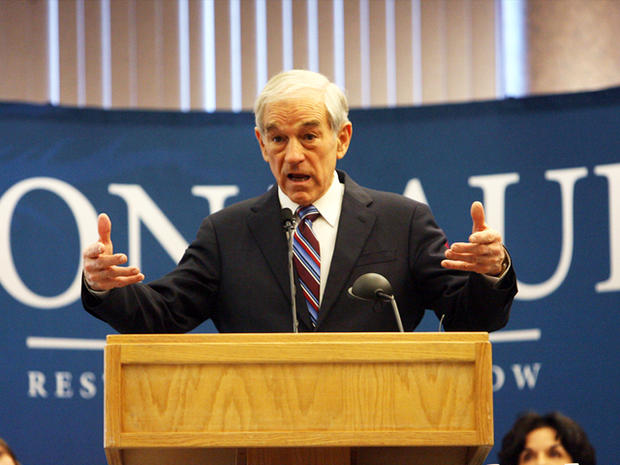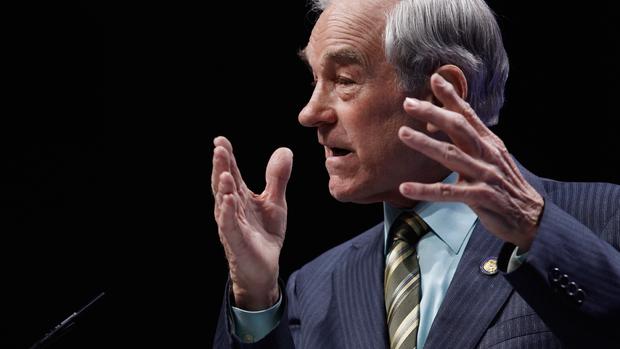For Ron Paul, winning isn't everything
At this point, it's clear that Texas Rep. Ron Paul is most likely not going to be the next president of the United States. Paul has yet to win a single contest (with one semi-exception), and CBS News estimates that he holds just 42 delegates - less than one tenth the delegates held by frontrunner Mitt Romney. Earlier this week, the last embedded reporter who had been covering Paul full time was pulled off the trail.
By the standards of the standard goal of a presidential run - actually winning the presidency - Paul's run is thus shaping up to be a failure. But victory was never the longtime Texas congressman's only goal: As Paul's team will openly admit, his presidential run has doubled as an effort to advance the Libertarian movement. And on that measure, there are reasons to already view it as a success.
Start with the vote totals. Despite his lack of wins, Paul has consistently won more votes in the 2012 cycle than he did in his presidential run four years ago. In Ohio, he went from 49,027 votes in 2008 to 111,238 votes in 2012; in Michigan, he went from 54,434 votes four years ago to 115,712 votes in this cycle. He more than quadrupled his vote total South Carolina, tripled it in New Hampshire and doubled it in Georgia.
Throughout the campaign, Paul has attracted the sort of crowds that also-ran candidates rarely see, including the 4,600 people that turned out to see him in Champaign, Illinois, on Wednesday. Meanwhile, his passionate supporters have continued to pour money into his campaign, even as Paul's odds of winning the nomination have gotten ever longer.
"It does seem like this is a real step forward within the Republican Party," said John Samples, who directs the Center for Representative Government at the Cato Institute, a Libertarian think tank. Noting that Paul's supporters tend to be younger and previously disengaged from the GOP, he added: "He's reaching a new constituency, and he's doing it in the context of a party that has concerns about the future."
The degree to which Paul has been able to move the GOP in his direction in the short term is up for debate. The other candidates and the Republican Party more broadly have largely not embraced Paul's effort to reduce the U.S. military footprint, decriminalize drugs or dramatically reduce the size of government; indeed, the candidate who seems to be most directly connected with the GOP base, Rick Santorum, is described by Samples as "the most consciously anti-Libertarian voice in the Republican Party."
Jesse Benton, Paul's campaign chairman, said he does see evidence that Paul's ideas are making a difference.
"There is a big debate right now inside the Republican Party on getting out of Afghanistan," said Benton. "Look at the monetary issue. You've got candidates across the country campaigning on sound money, the gold standard, auditing the Federal Reserve. You've got internet freedom - Republicans came together and they opposed SOPA." Benton also pointed to GOP efforts to cut spending, though he said such efforts have not gone nearly far enough.
Still, many Paul backers are taking the long view.
"The campaign really is for 2016," Silicon Valley billionaire Peter Thiel, who has given a total $2.6 million to the pro-Paul super PAC Endorse Liberty, . "I think we're just trying to build a libertarian base for the next cycle."
Benton stresses that the Paul campaign is not giving up on winning the nomination, though he concedes that Paul is not going to get the 1,144 delegates necessary to secure it before the GOP convention in August. He argues that if no candidate secures the nomination before August, Paul will ultimately triumph at the convention.
"A brokered convention is now our stated goal, and winning the nomination for Dr. Paul at said convention will require extensive politicking," he said. "We plan to head to a Tampa with every political bullet we have loaded in our gun, ready for the convention fight."
Assuming Paul does not win the nomination at the convention - and it's certainly a long shot, not least because fully 60 percent of Republican primary voters said they do not have confidence in Paul to be commander-in-chief in the latest CBS News/New York Times poll- he could still end up with a prominent speaking role, particularly if the eventual nominee needs Paul's support to get over the top.
The other candidates have complained that Paul and Romney appear to be working in concert despite their ideological differences, and there has been speculation the Paul campaign is now considering cutting a deal in which Paul would throw his support behind Romney if Romney falls short on delegates. Benton denies that speculation (as does Romney) and dismisses a possible prime convention speaking slot as "window dressing."
"It's something we'd like but it's not terribly important to us," he said. "We're looking potentially for Ron to be the vice presidential nominee...we're not looking for easy concessions like a speaking slot." He says the campaign would also push for a cabinet position for Paul or major changes to the party platform.
No matter what happens, Libertarians seem committed to moving the Republican Party toward their beliefs over the long term. Though Paul is now 76 years old - and likely on his last run for the White House - his son, GOP Sen. Rand Paul of Kentucky, appears poised to become the new face of the movement going forward. Samples, of the Cato Institute, says Paul may ultimately be remembered as the man who moved the Republican party away from the George W. Bush model and into the future.
"There's generational change going on here, and perhaps as time moves on you'll see a different kind of Republican who's closer to him," he said. "And as you look back, you might say he kind of foreshadowed what happened."
Benton's message to the party, meanwhile, is simple: Adapt or die.
"The party's at a crossroads," he said. "They're either going to start to embrace real limited constitutional government - and I think a lot of people are - or they're really going to struggle nationally."
"If they want to shrink this down into a little teeny tiny minority party," he added. "They can keep catering to the neoconservatives."
Full CBS News coverage: Ron Paul

